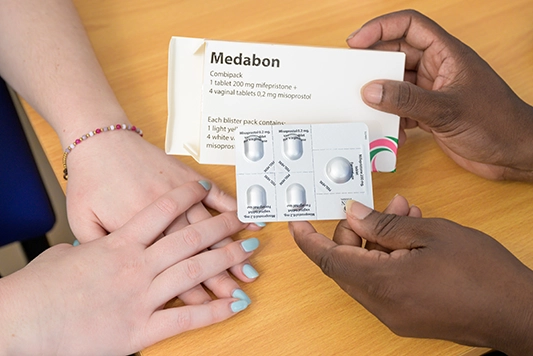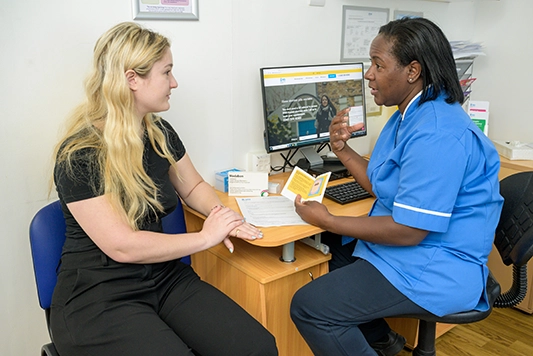If you’ve had sex without using contraception, or your contraception has failed (for example you’ve missed taking a contraceptive pill or the condom split), you could be at risk of becoming pregnant. It’s possible to get pregnant at any time in your monthly cycle and, although highly unlikely, you can even get pregnant when you’re on your period.
In this blog, you will find information on:
- What is emergency contraception and when can I take it?
- What are the signs of pregnancy?
- How soon after unprotected sex can I test for pregnancy?
- Where can I get a pregnancy test?
- What can I do if I find out I’m pregnant and I don’t want to be?
- How can I find out how many weeks pregnant I am?
What is emergency contraception and when can I take it?
Using contraception when having sex is always the best way to prevent a pregnancy – you can choose from a range of long term and short-term methods. Remember that condoms are the only contraception method that protect against a sexually transmitted infection (STI).
If you’ve had unprotected sex or your contraception has failed, emergency contraception can also prevent a pregnancy.
There are 3 types of emergency contraception:
- the emergency contraceptive pill Levonorgestrel (LNG), also known as Levonelle: it can be taken within 96 hours (four days) of unprotected sex, however it is most effective within the first 72 hours (three days).
- the emergency contraceptive pill Ulipristal Acetate (UPA) also known as Ellaone: this can be taken within 120 hours (five days) of unprotected sex.
When accessing emergency contraceptive pills, we recommend talking to a healthcare professional about the most appropriate option for you. There are a number of factors that may affect which of the emergency contraceptive pills (Levonorgestrel or Ulipristal Acetate) is right for you – for example, your medical history, weight, or if you are breastfeeding. When you seek emergency contraception, a healthcare professional will ask you questions and assess which method will be the most effective.
- the intrauterine device (IUD or coil): this is the most effective emergency contraception and can be fitted up to 120 hours or 5 days after unprotected sex. A copper coil is a small, T-shaped copper device that is placed in a woman’s womb and can provide contraceptive protection for up to ten years. One of the benefits of using the IUD is that, once fitted, you can then choose to continue to use it as your on-going form of contraception. Long-acting reversible contraceptive (LARC) methods offer excellent protection against pregnancy, ranging from three months up to ten years. They’re ideal if you know that you do not want to have children for a while.
It is very important to know that, because emergency contraception pills work by delaying the release of an egg from an ovary (therefore preventing pregnancy), it is unlikely to be effective when taken after ovulation (after the egg has been released from the ovary). This is why the most effective form of emergency contraception is the intrauterine device (IUD), also known as the coil. The IUD can be inserted up to 5 days after unprotected sex, or up to 5 days after the earliest time you could have ovulated (released an egg), to prevent pregnancy.
We recommend talking to a healthcare professional about this when seeking emergency contraception. It’s important to know the difference between the “morning after pill” and the “abortion pill”: the morning after pill prevents a pregnancy, which is why it does not cause an abortion.
If you want to read more about contraception options, follow these links:
At MSI UK, we believe that information about contraception should be readily available. If you need help finding the best contraceptive method for you, try our digital contraception counsellor “Choice”. Using “Choice”, you can receive personalised contraceptive advice by answering a few short questions about your lifestyle, preferences, needs and medical history.
What are the signs of pregnancy?
Signs and symptoms of pregnancy vary and can include the following:
- Late or missed period
- Swelling or tenderness of the breasts
- More frequent trips to the toilet
- Nausea or vomiting (‘morning sickness’ can in fact happen at any time of the day)
- Change in appetite
- Tiredness
When is it best to take a pregnancy test?
If you’ve had unprotected sex, your contraception has failed or you’ve taken a morning-after pill but you’re unsure if it worked (for example if your period is late, or if you have abnormal bleeding), it’s important you take a pregnancy test.
Different home pregnancy tests can have different sensitivities, so if you have any doubt that you’re pregnant – even when the test is negative – you should repeat the test a week later or make an appointment with your GP.
This is why we recommend taking a pregnancy test three weeks after unprotected sex, to ensure the accuracy of the result.
Where can I get a pregnancy test?
Home pregnancy testing kits are available in pharmacies and supermarkets. Your local GP, family planning clinic, specialist young people’s clinics like Brook, and some pharmacies can also provide free pregnancy testing.
What can I do if I find out I’m pregnant and I don’t want to be?
We understand that it can be distressing to find that you are pregnant unexpectedly, or unintentionally. Please know that you are not alone and that we are here to support you.
If you feel unable to talk to friends or family, you can speak to a MSI Reproductive Choices counsellor, your GP or a contraception and sexual health clinic. Any conversation with us about your options or counselling will always be confidential. The decision about whether to continue or end the pregnancy is yours to make. This might not be the same decision your friends or family would make.
If you’re not sure what to do, you have three choices to think about:
- Continue with the pregnancy and raise a child
- Continue with the pregnancy and consider adoption or fostering
- End the pregnancy through abortion
Read more about your pregnancy options.
How can I find out how many weeks pregnant I am?
How many weeks you have been pregnant can affect what abortion options are available to you, so it’s important to find this out.
After a positive pregnancy test result you can find out your gestation (how many weeks pregnant you are) by counting back the days to the first day of your last menstrual period. If you know the date of the first day of your last menstrual period, we can help you to work out your gestation. If you have irregular periods, no periods, or if the stage of the pregnancy is unclear, we will invite you to one of our clinics for a face-to-face appointment, where one of our nurses or midwives will check your exact gestation with an ultrasound scan and inform you of all options available to you.
If you’ve had a positive pregnancy result and you are now thinking about having an abortion, these are the options available to you:
- Medical abortion, also called “abortion pills” available up to 9 weeks and 6 days of pregnancy;
- Surgical abortion, available up to 23 weeks and 6 days of pregnancy.
The kind of treatment you may be offered will depend on a few factors. Your gestation (how many weeks pregnant you are), past medical history, gynaecological history, any medication you are taking and personal choice will determine which method is best for you.
Get in touch
At MSI Reproductive Choices, we are here for you and there are a number of ways you can contact us.
You can always get in touch should you have any questions about our services, would like to book an appointment or you have had treatment with us and want aftercare support.







